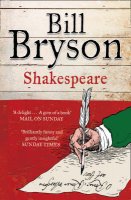
Shakespeare: The World as a Stage (Harper Perennial, London, 2007) by Bill Bryson
Once again, a hit for Bill Bryson. (Thanks, Stephan! You'll get the book back in January.) This time he tackles, with his usual wit and excellent writing, what we know (and, importantly, what we do not know) about the greatest English playwright.
Actually, it is arguable that Shakespeare was not, in truth, the greatest English playwright, but to their undeniable status as great works, his plays added the stellar quality of survival, most playwrights of that era not having had the benefit of compilers Henry Condell and John Heminges, who with unusual foresight put together a collection of most of Shakespeare's plays after his death. We don't know what we are missing.
Full many a gem of purest ray serene
The dark unfathom'd caves of ocean bear:
Full many a flower is born to blush unseen,
And waste its sweetness on the desert air.
(not Shakespeare)
On the other hand, we have certainly been spared a mountain of dreck.
To prosper, a theatre in London needed to draw as many as two thousand spectators a day—about 1 per cent of the city's population—two hundred or so times a year, and to do so repeatedly against stiff competition. To keep customers coming back, it was necessary to change the plays constantly. Most companies performed at least five different plays in a week, sometimes six, and useed such spare time as they could muster to learn and rehearse new ones. ... What is truly remarkable is how much quality the age produced in the circumstances. ... For authors and actors alike, the theatrical world was an insanely busy place, and for someone like William Shakespeare, who was playwright, actor, part owner and probably de facto director as well ... it must have been nearly hysterical at times. Companies might have as many as thirty plays in their active repertoire, so a leading actor could be required to memorize perhaps fifteen thousand lines in a season ... as well as remember every dance and sword thrust and costume change. Even the most successful companies were unlikely to employ more than a dozen or so actors, which meant a great deal of doubling up.
And you thought your life was crazy? Most of us, whatever our field of endeavor, like to think that we, too, could produce high quality work if only we had the time. But true geniuses, like William Shakespeare and Johann Sebastian Bach (whose job required him to write a new cantata every week, in addition to his other considerable responsibilities), create their great works in spite of, if not because of, tremendous pressure to produce.
It wasn't only work that was insane. If Hawaii's kapu system, abolished two centuries ago, oppressed its people with strange and oppressive rules, our Elizabethan ancestors were not much better off.
Sumptuary laws, as they were known, laid down precisely, if preposterously, who could wear what. A person with an income of £20 a year was permitted to don a satin doublet but not a satin gown, while someone worth £100 a year could wear all the satin he wished, but could have velvet only in his doublets, but not in any outerwear, and then only so long as the velvet was not crimson or blue, colours reserved for Knights of the Garter and their superiors. Silk netherstockings, meanwhile, were restricted to knights and their eldest sons, and to certain—but not all—envoys and royal attendants. Restrictions existed, too, on the amount of fabric one could use for a particular article of apparel and whether it might be worn pleated or straight and so on, through lists of variables almost beyond counting. ... Food was similarly regulated, with restrictions placed on how many courses one might eat, depending on status. A cardinal was permitted nine dishes at a meal while those earning less than £40 a year (which is to say most people) were allowed only two courses, plus soup.
Bryson's stories of the times in which Shakespeare lived and worked are at least as interesting as those about Shakespeare himself, and indeed they are necessary, as a book that simply reported what we know for sure about the man would be a very short story indeed. I suspect, however, that Bryson did more careful research on Shakespeare than on his era. Although it may be true, given those plague-ridden times, I suspect that his assertion that most of the inhabitants of Shakespeare's London were young people merely repeats the common life-expectancy fallacy.
By the peak years of Elizabeth's reign, London was one of the great cities of Europe, exceeded in size only by Paris and Naples. ... But survival was ever a struggle. Nowhere in the metropolis did life expectancy exceed thirty-five years, and in some poorer districts it was barely twenty-five. The London that William Shakespeare first encountered was overwhelmingly a youthful place.
Be that as it may, Bill Bryson's Shakespeare is an easy, delightful, and informative 195-pages to read. I recommend it highly.
It seems to me that if most adults in Shakespeare's London had a reasonably high life expectancy, it would merely mean that a cross-section through the grown-ups would look fairly normal to us. But we'd still be justified to call London youthful, for two reasons: One, there would be many more children than we are accustomed to seeing, and two, because people would generally have more than two children reach adulthood, the faster rate of population growth alone would mean we'd see more young people than old.


